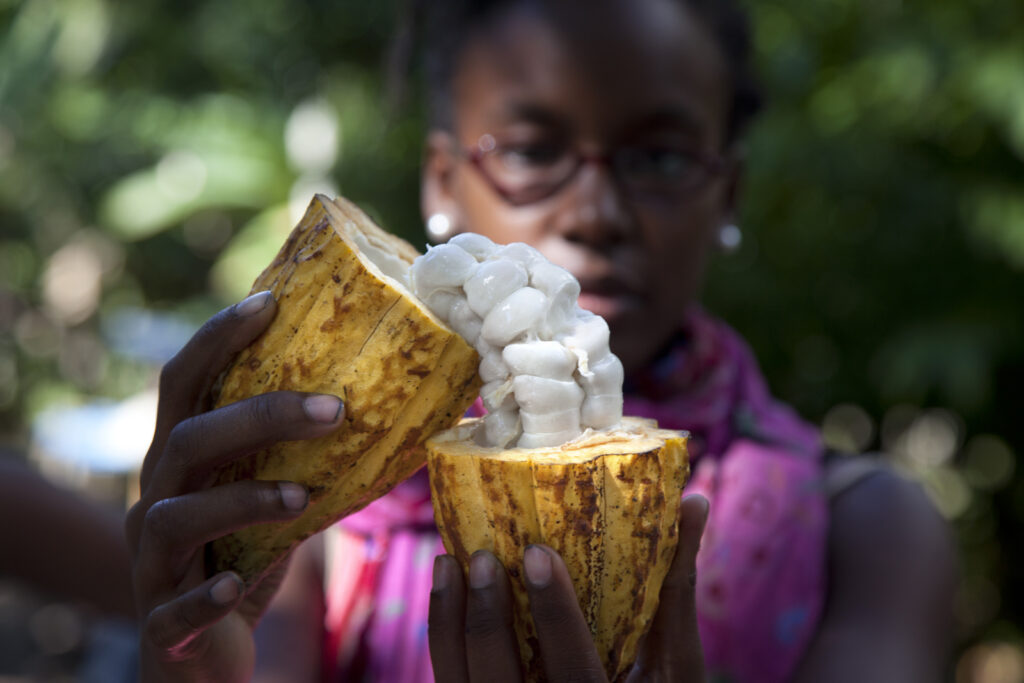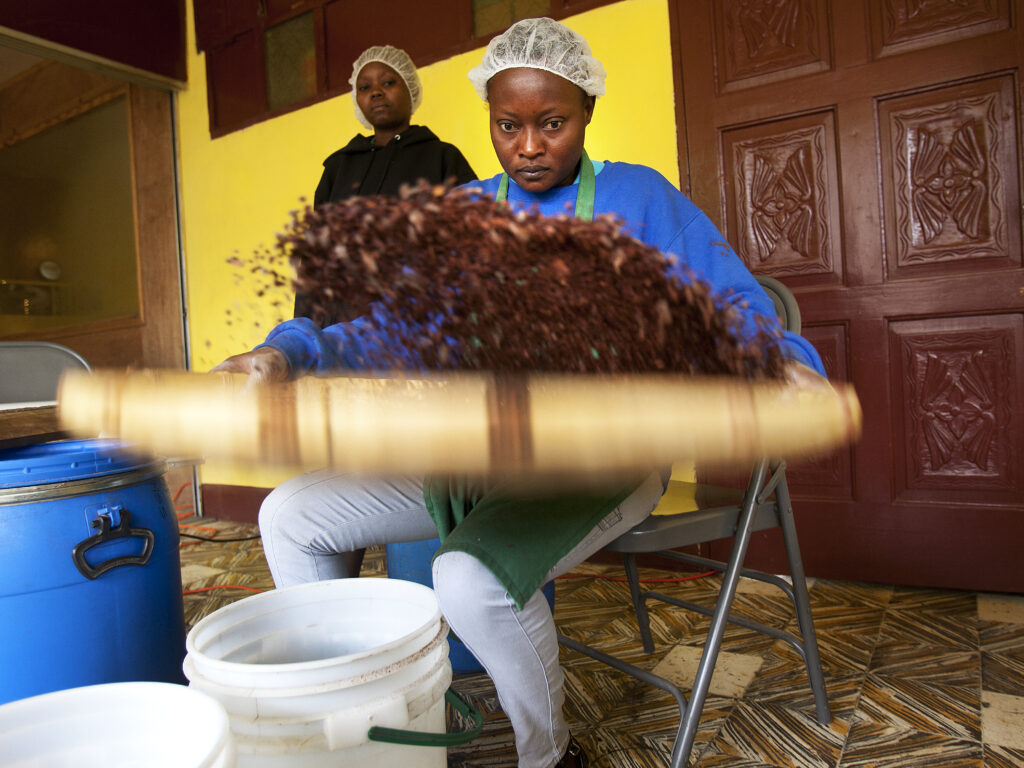
Bittersweet business
Askanya Chocolates continues to churn out opportunity in an increasingly troubled Haiti.

Askanya Chocolates continues to churn out opportunity in an increasingly troubled Haiti.
Bittersweet business is part of the Look back feature from the Spring 2023 issue of Michigan Engineer magazine.
“In Haiti, having a plan B isn’t enough. You have to have backup plans all the way through to Z.” That was how Corinne Joachim-Sanon (BSE IOE ’06) initially described running Askanya Chocolates, the high-end bean-to-bar chocolate factory she built in her late grandparents’ former home in northeastern Haiti. When The Michigan Engineer ran its original article on Askanya in the fall 2017 issue, it had been two years since Joachim-Sanon gave up her six-figure engineering job in the United States and founded the business as a way to create opportunity in her home country.
Today, that sentiment is truer than ever, as parts of Haiti—particularly in its capital, Port-au-Prince—have plunged into lawlessness following the 2021 assassination of Haitian President Jovenel Moïse. But Askanya has persevered, quadrupling its chocolate output and growing from three to seven full-time employees. These days, the company turns a modest profit and is slowly repaying its initial investment.
But for Joachim-Sanon, the profits, and even the artfully wrapped chocolate churned out at the bright blue concrete building in Ouanaminthe, are a means to an end. The ultimate goal is to create opportunity for Haitians, and Askanya continues to succeed by that measure as well. Its expanded staff earns middle-class wages, which are now paid in U.S. dollars rather than Haitian gourdes. That has helped keep employees’ income stable even as the value of the gourde has fallen by more than half since 2016.
Seven years later, we’re making our product and conducting our business and treating our employees in an ethical way.
James Dobson Belizaire and Jocelyne Diomètre, both of whom were featured in the 2016 article, have taken on leadership roles in the company. Belizaire is now head of operations, while Diomètre is head of production.

“They’re making the factory work,” Joachim-Sanon said. “There’s always someone roasting cacao or zesting limes, and it has been great to see the workers grow. Some have gotten married, some have had babies, one is working on a nursing degree. Jocelyne was a housekeeper before joining Askanya and now she’s head of production.”
Diomètre oversees a production process that, while still low-tech and labor-intensive, has grown more streamlined and efficient. Additional grinding and tempering machinery has increased output and lowered per-bar costs, with Diomètre carefully choreographing the production process according to the factory’s erratic access to electricity. She uses her growing income to pay for tuition, tutoring and after-school programs for her children, now 16, 15 and 11.

As head of operations, Belizaire oversees areas like order fulfillment, payroll and supply chain management. His stable income and work schedule have enabled him to earn a law degree at a local university. He now volunteers his free time to provide pro bono legal counsel to Haitians who have been accused of crimes and can’t afford lawyers.
Belizaire has also become a fluent English speaker, and Joachim-Sanon plans to begin sending him to the United States so that he can help manage Askanya’s growing network of American sales outlets and visit modern chocolate factories.
Askanya’s U.S. sales have grown dramatically since 2016, more than offsetting a collapse in domestic Haitian sales that has accompanied the country’s political crisis. The road to Port-au-Prince has become too dangerous to reliably carry chocolate to market, and many of Askanya’s middle-class Haitian customers have fled the country. But the security situation in northeastern Haiti, where the company’s factory and most of its farmers are located, is much better than in Port-au-Prince, and international exports can fly from nearby Cap Haïtien.
“We used to sell as much as 80% of our chocolate in Haiti, but now we sell 95% of our production in the U.S.,” Joachim-Sanon said. “Covid definitely gave our international online sales a boost, and I also think more people are seeking out natural ingredients and Black-owned and woman-owned businesses.”

Askanya’s network of farmers has also benefited from the company’s growing production. The approximately 3,000 small Haitian farmers who produce ingredients like cacao, sugar, oranges, limes and cashews have seen their orders from the company triple since 2016.
These days, Joachim-Sanon herself focuses mainly on growing Askanya’s sales and finding new retail outlets. The constant challenges of doing business in Haiti are expensive as well as stressful, so increasing volume and squeezing more profit out of every bar are essential to keeping the factory running and workers employed.
To that end, Joachim-Sanon has overseen a rebuild of the company’s website, entered into agreements with a variety of online retailers and expanded bricks-and-mortar retailing, including a distribution agreement with Texas grocery chain Central Market and an expanded presence at New York City’s holiday markets.
“I’d love for us to be a million-dollar business, but that hasn’t happened yet,” she said. “Will it happen? Maybe. But seven years later, we’re making our product and conducting our business and treating our employees in an ethical way. That part is working. And in a country like Haiti, that’s a lot.”
While flood-resiliency efforts continue, Indonesia plans to abandon Jakarta as its capital.
While hunger for an artificial intelligence that can think like a human remains unsated, AI continues to appear in our lives in smaller ways.
Not only can research participants control a prosthetic hand with their
minds—now they can begin to “feel” it, too.
Progress continues for upcycling urine as a safe agricultural fertilizer.
Photos by Marcin Szczepanski